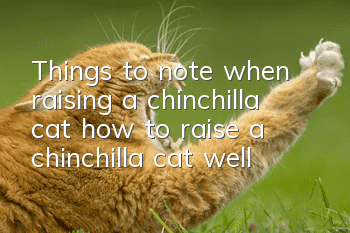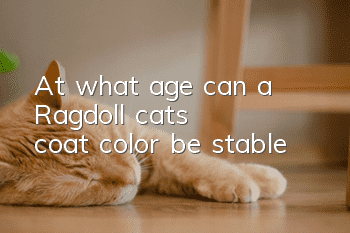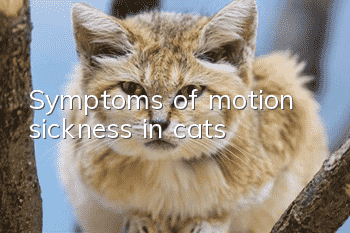Things to note when raising a chinchilla cat (how to raise a chinchilla cat well)

Chinchilla cats have very weak intestines and stomachs. If you are not careful, they will vomit and have diarrhea. For example, the following behaviors will cause great harm to the intestines and stomach of "Chinchilla cats". Pet owners should not do it again.
Long-term milk feeding
Chinchilla cats have a sensitive gastrointestinal tract, and there is a lot of lactose in milk. However, the cat’s body lacks the enzyme to break down lactose, so it is difficult for the cat to digest and absorb it, and diarrhea and other symptoms will occur. Pet owners should stop feeding chinchilla cats milk. They can give them Shuhua milk, pet milk, yogurt or goat milk powder.
Feed legumes
The gastrointestinal function of Chinchilla cats is not very good to begin with. For some foods that are not easy to digest, such as soybeans, peas and other legumes, pet owners should feed their cats less and less starchy foods. Cat gastrointestinal problems Very difficult to digest. Frequent feeding of legumes to Chinchilla cats can easily damage the cat’s gastrointestinal tract, so pet owners should stop feeding them.
Don’t be picky when eating fish
When pet owners feed fish to chinchilla cats, they feed it to the cat along with the fish bones. These fish bones can easily scratch the cat's intestines and esophagus, causing gastric bleeding. It is recommended that when pet owners feed fish to chinchilla cats, they should pick out the fish bones before feeding them.
No hair removal cream
Chinchilla cats have long hair, and they spend most of the day licking their hair. This can easily lead to cats licking their hair too much and causing accumulation of hair balls in their bodies, leading to hair ball syndrome, which can damage the cat's gastrointestinal tract. The pet owner should feed the chinchilla cat hair removal cream regularly to help eliminate hair balls.
Overfeeding
Some pet owners hope that their chinchilla cats can eat fatter, but are also worried that they will not be full, so they feed them a lot. Cats who eat too much for a long time can easily increase the burden on the gastrointestinal tract, cause indigestion, and damage the gastrointestinal tract. It is recommended that pet owners should not feed Chinchilla cats too much. It is enough to keep the cat seven to eight times full.
Feeding indiscriminately
The gastrointestinal tract of the chinchilla cat is very fragile. If the pet owner feeds the cat randomly and gives it everything, it will also cause great harm to the gastrointestinal tract of the chinchilla cat. It is recommended that the pet owner should not feed it too greasy, Food that is too salty can easily increase the burden on the gastrointestinal tract and lead to serious problems such as kidney failure. It is best to choose a low-salt, light, easy-to-digest cat food as the staple food, which can protect the cat’s intestinal health.
- What should you pay attention to when your cat blows the air conditioner?
- What breed is the king of cats?
- What does a cat meowing at night mean?
- Do you mind if your new kitten meows?
- How long can a cat with folded ears live with rickets?
- What are the care methods for British shorthair cats?
- How many days will a female cat poop after being neutered?
- Why do British shorthair cats cry?
- What to do if a cat doesn’t like drinking water
- Why do fold-eared cats have big feet?



